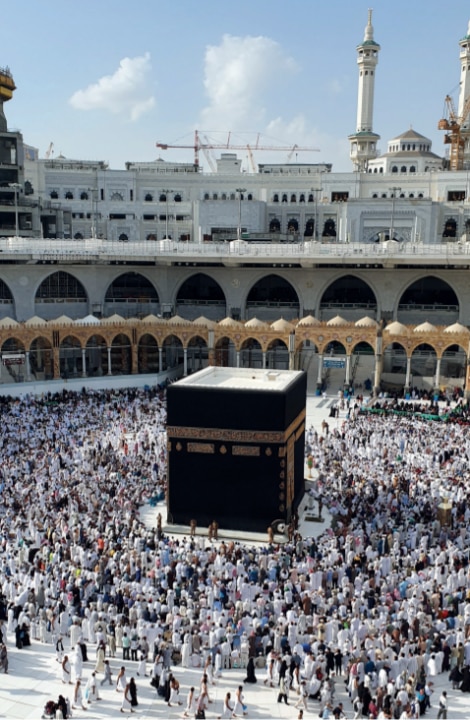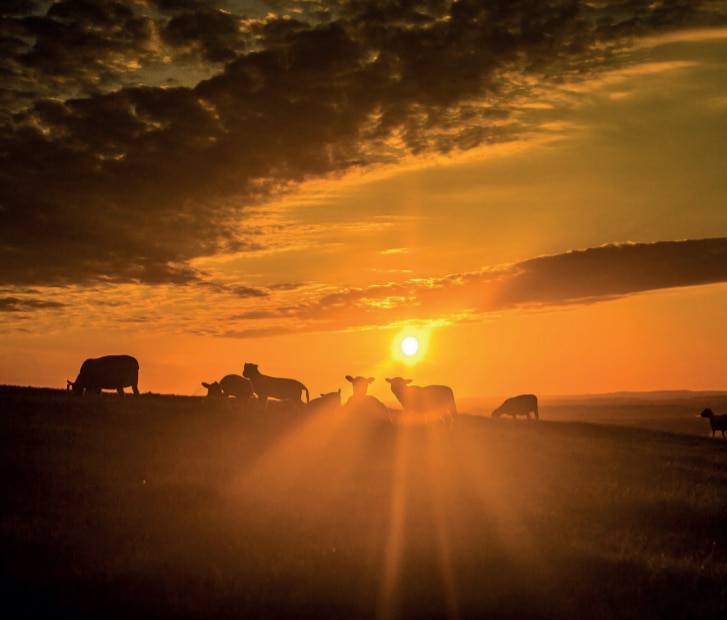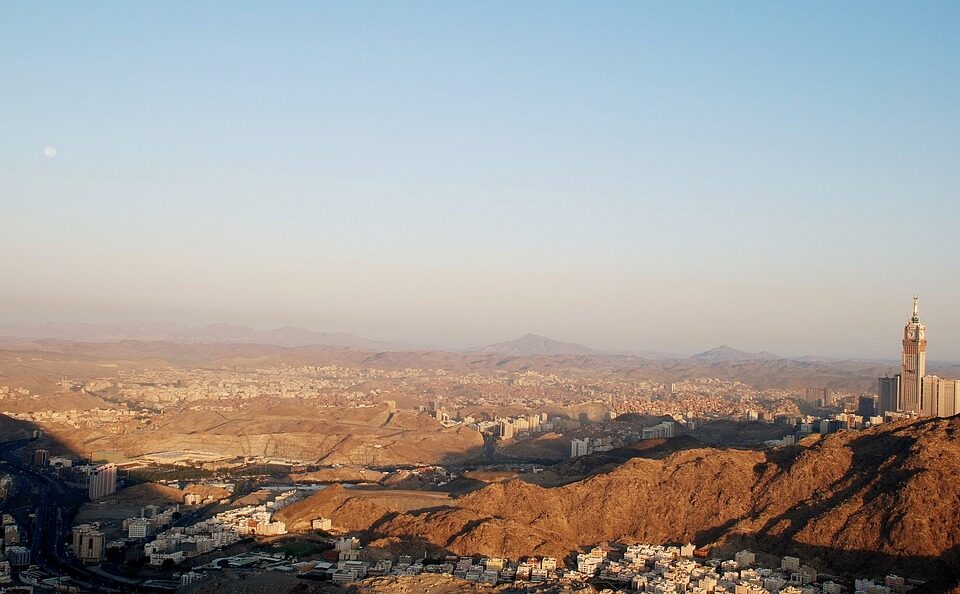Ata-ul-Haye Nasir, Al Hakam
Every religion and nation has different ways of celebrating religious and cultural festivals, but the method of celebration and commemoration in Islam is different from other religions in many ways. One key aspect is that the wisdom behind Islamic festivals, such as Eids, is different from other celebrations.
Islam has taught Muslims how to celebrate Islamic festivals such as Eid. The Holy Quran and the sayings of Prophet Muhammadsa and the Promised Messiahas provide us with complete guidance and direction.
In this article, I will briefly outline some of the Islamic teachings regarding Eid-ul-Adha, Hajj and sacrifice.

Takbirat during the days of Eid-ul-Adha
It is recorded in the ahadith (sayings of Prophet Muhammadsa) that the Holy Prophetsa used to recite takbirat after all the obligatory prayers from the dawn of the ninth day of Dhul-Hijjah to the last day of the Tashreeq days, that is, the Asr prayer of the thirteenth day of Dhul-Hijjah. The takbirat are as follows:
اَللّٰهُ أَكْبَرُ اَللّٰهُ أَكْبَرُ لَا اِلٰهَ اِلَّا اللّٰهُ وَاللّٰهُ أَكْبَرُ اَللّٰهُ اَكْبَرُ وَلِلّٰهِ الْحَمْدُ
Hazrat Alira and Hazrat Ammarra narrated that the Holy Prophetsa used to recite the takbirat from the Fajr prayer of 9 Dhul-Hijjah, to the Asr prayer on 13 Dhul Hijjah. (Al-Mustadrik lil-Hakim, Book of Eidain, Chapter Takbirat al-Tashreeq)
Time for offering Eid prayer
The time for Eid prayers is from sunrise to when the sun reaches its zenith.
The jurists agree that the time of Eid prayer starts after the rising of the sun. Meaning, about half an hour after sunrise and it lasts until the sun reaches the zenith, that is, before the time of Zuhr begins. (Al-Fiqh al-Islami, by Wahbah Mustafa al-Zuhayli, Vol. 2, p. 366, Salat al-Eidan)
It is also sunnah (custom of the Prophetsa) not to eat anything before the Eid prayer on the morning of Eid-ul-Adha.
Hazrat Abdullahra narrated from his father, Buraidahra, that the Holy Prophetsa would not go for Eid-ul-Fitr without eating, and on the day of Eid-ul-Adha, he would not eat until he had offered the Eid prayer. (Sunan at-Tirmidhi, Abwab al-Eidain, Hadith 542)
Using different routes
It was narrated from Muhammad bin Ubaidullah bin Abu Rafi, from his father, from his grandfather, that the Messengersa of Allah used to come to Eid prayers walking, and that he would go back via a different route than the one he began with. (Sunan Ibn Majah, Kitab Iqamat as-Salat wa al-Sunnah Fiha, Hadith 1300)
No supererogatory prayers before and after the Eid prayers
Hazrat Saeedra bin Jubair narrates from Hazrat Ibn Abbasra that the Holy Prophetsa went out on the day of Eid and offered two rak‘aat, and no prayer was offered before or after them. (Sahih al-Bukhari, Kitab al-Eidain, Hadith 989)
Seven takbirat in the first rak‘ah and five takbirat in the second rak‘ah
Kathir ibn Abdullah narrates through his father, Abdullahra, and his grandfather that the Prophetsa recited seven takbirat in the first rak‘ah and five takbirat in the second rak‘ah before reciting [Surah al-Fatihah] on both Eids. (Sunan at-Tirmidhi, Abwab al-Eidain, Hadith 536)
Leave hands open after takbirat
While reciting takbirat during the Eid prayer, the hands are taken to the earlobes, lowered back down to the sides and left open. Therefore, it is written in Fiqh-e-Ahmadiyya:
“Both imam and muqtadi [the one following in prayer] should raise their hands to their ears while reciting takbirat and leave them open.” (Fiqh-e-Ahmadiyya, p. 179)
If someone joins the second rak‘ah of Eid prayer
Jurists agree that in the case of someone joining the second rak‘ah of the Eid Salat, the muqtadi should complete their rak‘ah after the salaam of the imam and also perform the takbirat.
For this, they provide the following reference:
“Offer the part of the prayer that you could with the imam, and complete the remaining part later.” (Sahih al-Bukhari, Kitab al-Azan)
Islamic teachings related to sacrifice

In the Holy Quran, Allah the Almighty states:
لَنۡ یَّنَالَ اللّٰہَ لُحُوۡمُہَا وَلَا دِمَآؤُہَا وَلٰکِنۡ یَّنَالُہُ التَّقۡوٰی مِنۡکُمۡ
“Their flesh reaches not Allah, nor does their blood, but it is your righteousness that reaches Him.” (Surah al-Hajj, Ch.22: V.38)
In his commentary of this verse, Hazrat Mirza Ghulam Ahmad, the Promised Messiahas stated:
“That is, ‘The flesh of your sacrifices does not reach God, nor does blood reach Him, but your righteousness does.’ That is, fear Him so much that you die in His way, and just like you slaughter sacrificial animals with your own hands, in the same way, you should sacrifice yourselves in the way of God. When [the level of] taqwa [righteousness] is less than this, it is still flawed.” (Chashma-e-Ma‘rifat, Ruhani Khazain, Vol. 23, p. 99, Footnote)
Sacrificing an animal on Eid is obligatory only for those who can afford it
A letter from a man was presented before the Promised Messiahas that he had put a small amount of money somewhere as part of a sacrificial animal, but they excluded him from that part as he was an Ahmadi. He asked whether his sacrifice would be accepted if he gave that money to the miskeen fund (for the less privileged) of Qadian.
Huzooras replied:
“It can only be called a sacrifice by sacrificing [the animal]. It cannot be done by giving money to the miskeen fund. If your funds permit, sacrifice a goat. If there is less and you cannot afford more, then it is not obligatory on you to sacrifice an animal.” (Badr, 14 February 1907, p. 8)
How old should a goat be?
A question was asked to the Promised Messiahas whether it was permissible to sacrifice a one-year-old goat. He said:
“Ask Maulvi Sahib [Hazrat Hakim Maulvi Nuruddinra]. The Ahl-e-Hadith and the Hanafis differ on this point.” (Badr, 23 January 1908, p.2)
Note by the editor of Badr:
“Maulvi Sahib’s research is that according to the Ahl-e-Hadith, it is not permissible to sacrifice a goat less than two years old.”
What are the conditions for a sacrificial animal?
The Holy Prophetsa stated:
“On the occasion of Eid-ul-Adha, sacrifice such an animal which is musinnatun [grown-up] but if it is difficult to find such an animal, then sacrifice a baby ram.” (Sahih Muslim, The Book of Sacrifices, Hadith 1963)
In camels, musinnatun is the one that has reached the age of five years and has entered the sixth year. In cows and oxen, musinnatun is the one that has reached the age of two years and has entered the third year. In goats and fat-tailed sheep, musinnatun is the one that has passed one full year of its life and has entered the second year. Therefore, for the sacrifice of these animals, it is necessary for the animal to be musinnatun.
There is a difference of opinion among the scholars regarding a baby ram, as mentioned in the hadith above. According to some, it is a baby of one year, while to others, it is a six-month-old and according to some, a baby of seven months.
Animals that are to be sacrificed must be without fault. The Holy Prophetsa forbade the sacrifice of animals with defects. He said:
“The sacrifice of four types of animals is not permissible: an animal whose vision is impaired, a sick animal whose disease is clearly visible, a crippledanimal whose injuries or disabilities are clearly visible, and a weak and thin animal.” (Sunan Abi Dawud, Kitab al-Dahaya, Hadith 2802)

Islamic teachings regarding Hajj
Hajj is the fifth pillar of Islam. A Muslim must perform Hajj at least once in their lifetime if economic and other conditions are favourable. Allah the Almighty states:
وَلِلّٰہِ عَلَی النَّاسِ حِجُّ الۡبَیۡتِ مَنِ اسۡتَطَاعَ اِلَیۡہِ سَبِیۡلًا
“And pilgrimage to the House is a duty which men – those who can find a way thither – owe to Allah.” (Surah Aal-e-Imran, Ch.3: V.98)
The focal point of Hajj is the Holy Ka‘bah, which was rebuilt by Prophet Abrahamas some 4,000 years ago. Today, the Ka‘bah stands in the middle of a large courtyard of Masjid al-Haram, or the Sacred Mosque.
The Hajj is performed during the Islamic month of Dhul-Hijjah.
A basic part of Hajj: Tawaf
Allah the Almighty states:
ثُمَّ لۡیَقۡضُوۡا تَفَثَہُمۡ وَلۡیُوۡفُوۡا نُذُوۡرَہُمۡ وَلۡیَطَّوَّفُوۡا بِالۡبَیۡتِ الۡعَتِیۡقِ
“Then let them accomplish their needful acts of cleansing, and fulfil their vows, and go around the Ancient House.” (Surah al-Hajj, Ch.22: V.30)
Safa and Marwah
Allah the Almighty states:
اِنَّ الصَّفَا وَالۡمَرۡوَۃَ مِنۡ شَعَآئِرِ اللّٰہِ ۚ فَمَنۡ حَجَّ الۡبَیۡتَ اَوِ اعۡتَمَرَ فَلَا جُنَاحَ عَلَیۡہِ اَنۡ یَّطَّوَّفَ بِہِمَا ؕ وَمَنۡ تَطَوَّعَ خَیۡرًا ۙ فَاِنَّ اللّٰہَ شَاکِرٌ عَلِیۡمٌ
“Surely, Al-Safa and Al-Marwah are among the Signs of Allah. It is, therefore, no sin for him who is on pilgrimage to the House, or performs Umrah, to go round the two. And whoso does good beyond what is obligatory, surely then, Allah is Appreciating, All-Knowing.” (Surah al-Baqarah, Ch.2: V.159)
Sacrifice and Shaving Head
Allah the Almighty states:
وَلَا تَحۡلِقُوۡا رُءُوۡسَکُمۡ حَتّٰی یَبۡلُغَ الۡہَدۡیُ مَحِلَّہٗ ؕ فَمَنۡ کَانَ مِنۡکُمۡ مَّرِیۡضًا اَوۡ بِہٖۤ اَذًی مِّنۡ رَّاۡسِہٖ فَفِدۡیَۃٌ مِّنۡ صِیَامٍ اَوۡ صَدَقَۃٍ اَوۡ نُسُکٍ
“And do not shave your heads until the offering reaches its destination. And whoever among you is sick or has an ailment of the head, should make an expiation either by fasting or almsgiving or a sacrifice.” (Surah al-Baqarah, Ch.2: V.197)
Prohibitions during Hajj
Allah the Almighty states:
اَلۡحَجُّ اَشۡہُرٌ مَّعۡلُوۡمٰتٌ ۚ فَمَنۡ فَرَضَ فِیۡہِنَّ الۡحَجَّ فَلَا رَفَثَ وَلَا فُسُوۡقَ ۙ وَلَا جِدَالَ فِی الۡحَجِّ
“The months of the Hajj are well known; so whoever determines to perform the Pilgrimage in these months, [should remember that] there is [to be] no foul talk, nor any transgression, nor any quarrelling during the Pilgrimage.” (Surah al-Baqarah, Ch.2: V.198)

